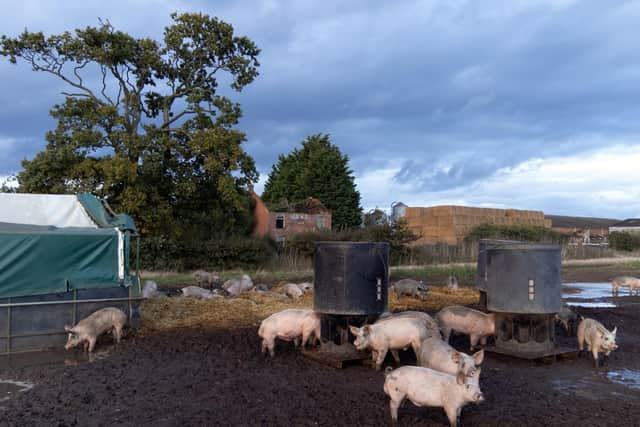How farming’s labour crisis affects us all as pigs culled – Lucinda Douglas


The fuel ‘crisis’ did however indicate how vulnerable supply chains are in the face of a sudden increase in demand.
Advertisement
Hide AdAdvertisement
Hide AdSome media outlets are already zooming in on consumer fears about a Christmas devoid of toys and turkeys. It is not just about lorry drivers – the convergence of Brexit and Covid has made an historic labour shortage more acute.


Brexit has reduced the number of migrant workers permitted into the UK as a result of changes to immigration policy, and Covid has severely restricted the free movement of labour within and outside our borders.
It is what it is, and labour shortages need to be addressed. The agricultural and rural business sector has not escaped the ravages of being short on labour. If we think about the fuel ‘crisis’, we should prevent a similar situation as it concerns our food production and supply.
Advertisement
Hide AdAdvertisement
Hide AdIt is not just about the supply of turkeys. I recently spoke to one farmer in the Outer York area who spoke about the direct impact the labour shortage is having on both his potatoes and pig farming operations. Not only is there a shortage of hauliers, but it extends to shortages of butchers and other food processors in the supply chain.


This backlog (the National Pig Association estimate a 100,000 pigs) means that less pigs are slaughtered at their optimum weight. In turn, this causes animal welfare issues for the farmer, which is economically crippling and distressing in equal measure.
Meanwhile, speaking of animal welfare, there is also a shortage of vets in Britain. Processors such as North Yorkshire’s Heck sausages are looking at employing migrants and ex-offenders at their plant to plug the gap in local labour supply.
Over the summer, a raspberry farmer near Sand Hutton had to open his farm to the public to pick berries for free rather than letting them rot after he could not find sufficient pickers.
Advertisement
Hide AdAdvertisement
Hide AdThere are other examples of milk being dumped, fruit and vegetables being left unharvested – all as a result of there not being sufficient workers, both skilled and unskilled. Most of the latter products are perishable, and there is only a short period for produce to be transported to markets and retailers.


Other rural businesses within the tourism and hospitality sectors are also impacted. It is very rare to see such establishments without one or more vacancies advertised. The situation is made more serious after the sudden boom in ‘staycations’ after the economy was reopened in the summer.
The direct impacts on the rural sector, especially in relation to food production, will also be felt by British consumers, especially in terms of shortages and higher prices if the ‘fork’ demand outstrips ‘farm’ supply. There are many dominoes in the food supply chain, and if one falls, so will all the others. Perhaps a greater focus should be on the UK’s self-sufficiency and food security but then, this will be highly dependent on an adequate workforce.
The CLA (Country Land and Business Association) urges government to look at finding long-term solutions. Sending in the army whenever there is a chink in the supply chain is a stop-gap of very time-limited use. Tackling labour shortages could include greater incentives to employ domestic workers.
Advertisement
Hide AdAdvertisement
Hide AdHowever, this would require holistic thinking. Employing more people in rural areas would require affordable housing and improved transport options. Enticing workers into roles where there are shortages would require government to invest in sector-specific apprenticeships and training programmes to cater for the younger workers and to re-skill older workers. Such a package should be designed where it can add real value to both the relevant sector as well as the individual.
It is also imperative that, in the face of domestic labour shortages, our immigration policy needs to be flexible to accommodate Britain’s economic needs, which goes beyond providing seasonal worker visas in the short term.
Government must provide a clear framework for allowing skilled workers to enter the UK labour market, with the potential to remain permanently. Skilled workers should be differentiated from seasonal workers, particularly as the former might bridge a skills gap within the rural sector on a longer-term basis.
Farms and other rural businesses need to know there is a flexible, skilled and secure workforce so they can plan for the future, invest in their businesses and secure or create jobs.
Advertisement
Hide AdAdvertisement
Hide AdCovid-19 and Brexit have challenged food supply chains like never before, and it is vital to address current labour shortages to focus on food production and processing businesses to ultimately benefit consumers in the longer term.
Support The Yorkshire Post and become a subscriber today. Your subscription will help us to continue to bring quality news to the people of Yorkshire. In return, you’ll see fewer ads on site, get free access to our app, receive exclusive members-only offers and access to all premium content and columns. Click here to subscribe.
Comment Guidelines
National World encourages reader discussion on our stories. User feedback, insights and back-and-forth exchanges add a rich layer of context to reporting. Please review our Community Guidelines before commenting.